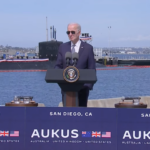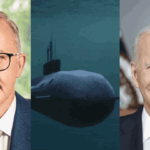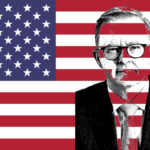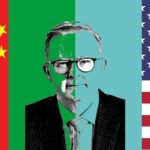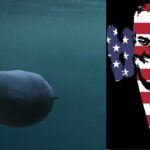Albanese Gifts Australian Autonomy to US, as We Become Frontline in War on China
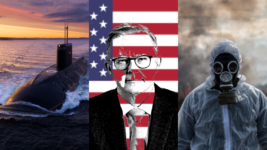
A visually uncomfortable Anthony Albanese featured on The Project on Thursday night, as appearing on the popular TV program, the PM could no longer deliver the friendly banter the country had grown used to over his honeymoon period, as we all know now, he’s sold out the nation.
The Labor leader who, for a brief moment in time, held the potential for change has, with the AUKUS deal announcement on Tuesday, dashed all hopes of an independent and peaceful future for Australia, as he rather relegates us to the status of an outlying US empire military base.
Indeed, while Julian Assange supporters have long been petitioning Albanese to step up and do more to secure the release of the WikiLeaks founder, over this week, it’s become apparent that task may prove more difficult as the line between US and Australian jurisdictions is increasingly blurring.
The details of the AUKUS deal make clear that a US-UK rotational force of nuclear-powered submarines (SSN) will be established in the west of this country by 2027, and we’re to invest a cool $368 billion in our own conventionally-armed SSN capabilities over the next 32 years.
But this week’s fanfare, and the accompanying release of AUKUS-related documents, fail to mention that the main concern for the US and the UK in fitting out Australia with SSN technology is that it’s part of the build-up to war with China and it establishes this country as a frontline in that conflict.
“Three aggressors”
Standing on a podium at San Diego’s Naval Base Point Loma on what was Monday afternoon in California, Anthony Albanese, and his counterparts US president Joe Biden and UK prime minister Rishi Sunak, unveiled the details of the AUKUS arrangement.
The tri-nation agreement involves this country spending up to $368 billion at the cost of essential services, utilising nuclear technology in warfare, storing nuclear waste, while ultimate control of the subs will remain with the US and UK due to the technology used being beyond local capabilities.
“This will be an Australian sovereign capability, built by Australians, commanded by the Royal Australian Navy and sustained by Australians in Australian shipyards, with construction to begin this decade,” our prime minister said, as he addressed the crowd at the US naval base.
“This investment is akin to the creation of the Australian automotive industry,” he continued, in spruiking the manufacturing perks that will come with the building of five SSN subs in SA by 2055, which will bring “20,000 direct jobs” and skill up our workforce on nuclear technology.
But this “biggest single investment” in defence also marks a windfall for the US and UK, with our nation not only investing $3 billion to increase their submarine building capacities, but we’ll be forking out further billions to fit the cost of the technology and capabilities those countries provide.
Empire-building
The AUKUS (Australia-UK-US) pact was launched under former PM Scott Morrison, Biden and then UK PM Boris Johnson in September 2021. Australia’s acquiring SSN subs and other weaponry is key, and it’s clear that the enhanced security relationship has rising China directly in its sights.
Morrison appeared on the ABC’s 7.30 Report on Tuesday evening, as the “father of AUKUS”, telling Sarah Ferguson that he was “pleased that the new government has followed through on… what they were tasked to do”.
At the time of the San Diego announcement, the White House released an AUKUS fact sheet, outlining the four phases of the arrangement.
The first phase comprises of Australian troops becoming embedded in the US and UK navies to accelerate their training and development, while the US is to increase its SSN port visits to this country commencing this year, with UK submarines beginning to swing by more often from 2026.
Then, by 2027, the US and UK are to have established an SSN rotational force at HMAS Stirling near Perth in WA. And the Submarine Rotational Force – West (SRF-West), coupled with increasing SSN visits prior, are supposed to tide Australia over in terms of its capability gap this decade.
The third AUKUS phase sees our nation purchasing at least three second-hand US Virginia-class SSN submarines, with this “critical” development in the AUKUS plan ensuring that Australia has its own undersea capability by the early 2030s.
And finally, Australia and the UK will commence building new conventionally-armed nuclear-powered submarines known as SSN-AUKUS “in their domestic shipyards before the end of this decade”.
The first such Australian submarine will be unveiled in the early 2040s, with a total of five being built by 2055.
Handing over the keys
In terms of SRF-West, the fact sheet states, “This rotational presence will comply fully with Australia’s longstanding position of no foreign bases on its territory.”
This assertion, however, has long been a controversial proposition, when considering the Joint Defence Facility at Pine Gap, the most important offshore intelligence operation for the US, which has been running since 1970, as well as the joint naval communication facility at North West Cape.
The 2014 Force Posture Agreement formalised military arrangements established in 2011, which provide US forces with unimpeded access to, and at times complete control of, specific Australian military facilities, as well as enhancing air force interoperability between the two nations.
And this Gillard era initiative has led to the annual rotation of over 2,500 US troops through bases in the north, with a recent US facilitated upgrade of RAAF Base Tindal, including space for six US B-52 bombers, with no obligation for disclosure of whether they’re equipped with nuclear warheads.
Warring on China
Of course, with the build-up in the rhetoric regarding war on China, which commenced under the Morrison administration and has since been gleefully progressed by Albanese, there is no denying that the AUKUS deal is about establishing a viable presence down under with Beijing in its sights.
So irked was Paul Keating by the deal that the former Labor PM appeared at the National Press Club on Wednesday, and, as he ripped Albanese, defence minister Richard Marles and foreign minister Penny Wong all new ones, he confirmed that AUKUS is about completing US containment of China.
Keating further asserted that China poses no real threat to Australia, which is a view shared by veteran Australian journalist Brian Toohey, who referred to the AUKUS partners as the “three aggressors” and he called them out over the devastation they caused in Iraq earlier this century.
Along with AUKUS, another security pact, the Quad, has become of increasing importance over recent years. This involves the US, Japan, India and Australia – a group of nations surrounding China – with countering the East Asian giant’s presence in the Indo Pacific region being its chief concern.
Albanese’s first act on taking over the top ministerial position was to fly to Japan to attend a meeting of the Quad, which is to next meet in this country in May.
While December’s annual AUSMIN conference saw the Washington invite Japan to integrate into the US military operations now operating in Australia.
Those agreeing with Keating, in that China poses no real threat to our nation, are being labelled old fashioned. However, silencing these truths is now part of the propaganda machine facilitating the build-up to war, with such assertions likely to be considered treasonous in the future.
Since World War Two, Australia has followed the US into eight foreign theatres of war, with each involving no direct threat. And rather than any war posturing coming from China, our nation is about to enter into a conflict with our biggest trading partner due to the economic concerns of the US.
But the clear difference in the present when compared with those past battles, is that while China now poses no threat to our country, as we become the frontline location for AUKUS and it’s goading the Asian nation into war, this continent further becomes an ideal US position for Beijing to strike.


